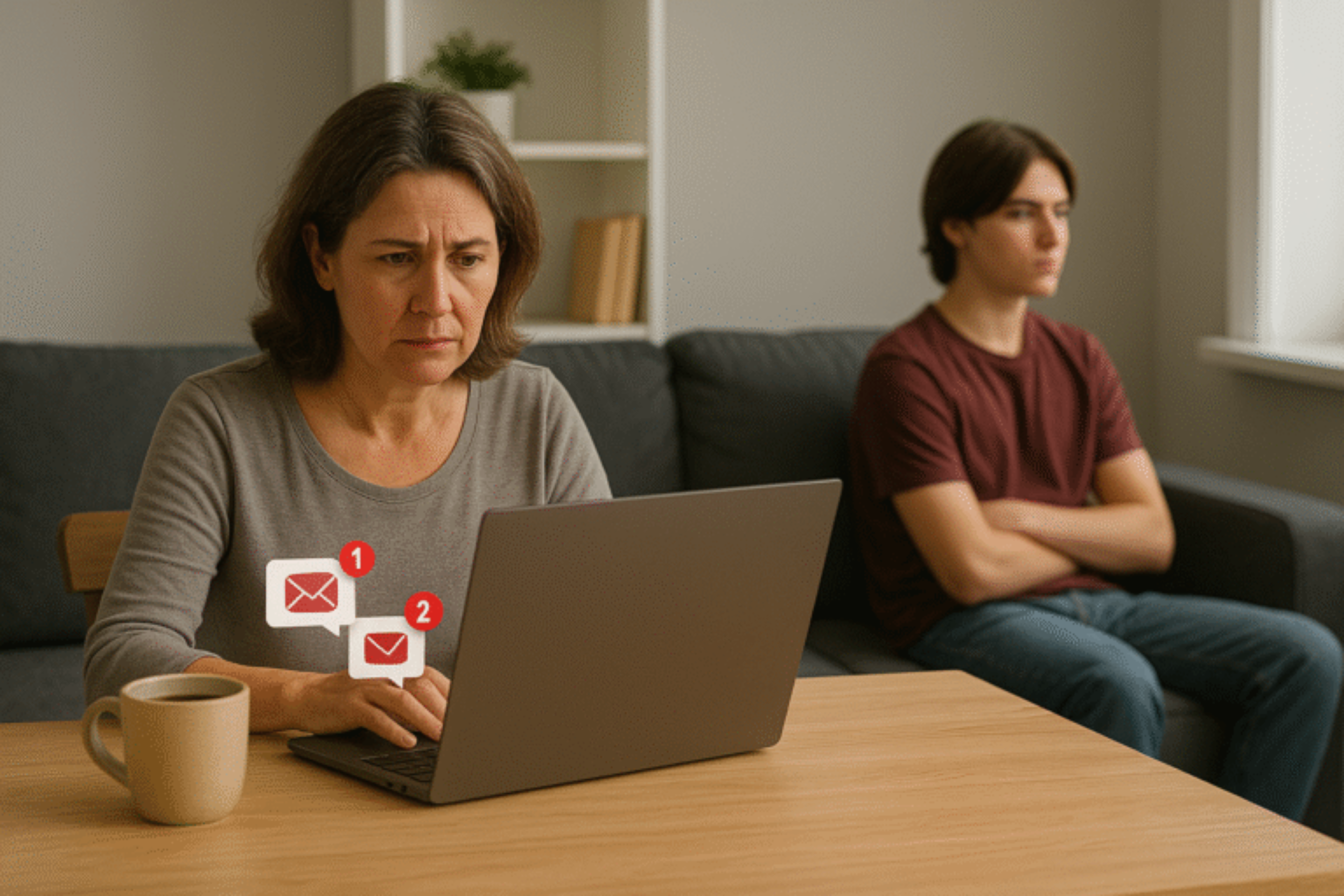Neither side fully sees what the other is going through.
Parents carry the weight of responsibility, worry, and the desire to guide. Teens are navigating pressures their parents never had to face… digital stress, identity questions, and the need to carve out independence. For many San Diego families, this cycle feels endless (but also, neither side wants this).
Due to a generational gap, it’s no wonder conversations so easily turn into clashes. Both are hurting and trying, but without better communication, arguments will only pile up, and the distance will grow.
So, in this blog, we’ll tell you why these conflicts keep increasing, what makes mediation different from therapy or court, and how families in San Diego can use it to finally find peace at home.
Keep Reading!
Why Arguments With Gen Z Teens Keep Escalating (and the Cost of Avoiding Them)
Arguments between parents and teens rarely start big. But for many San Diego families, these small sparks quickly become full-blown fights. Why? Because beneath the surface, there are deeper challenges at play. Few reasons are discussed below:
- Gen Z Adolescence Challenges
Gen Z is growing up in a world unlike any before. Social media adds constant pressure to compare. Academic demands are high. Issues of identity, belonging, and independence weigh heavily. It’s not that they don’t care about rules… it’s that they’re already juggling more than parents may realize.
- Gen Z Major Issues
When Gen Z teens open up in therapy, they often talk about feeling unheard, misunderstood, or pressured to live up to expectations. Many describe home as another place where they can’t fully express themselves. This builds frustration, which shows up as defiance or silence during conflicts.
- Why Parents Feel Unheard and Frustrated Too
Parents aren’t villains in this story. They’re carrying their own weight… working long hours, worrying about safety, trying to guide kids who seem to push them away at every turn.
Teens often see their parents’ advice as outdated, which can widen the gap. When parents’ advice or authority is ignored, it feels like a lack of respect. And over time, that resentment builds.
- Why Traditional Discipline Escalates Instead of Solving
Traditional discipline methods, like ‘Because I said so,’ may feel natural to parents but often backfire with Gen Z teens. Teens see it as dismissive. Parents see pushback as disrespect. Both sides walk away more defensive than before, creating a cycle where no one really wins.
The Cost of Avoiding Conflict
Some families choose silence over arguments, thinking it keeps the peace.
But avoiding conflict doesn’t make it disappear; it leaves unhealed wounds.
The result? A home where parents and teens live under the same roof but feel miles apart emotionally. Over time, that distance becomes harder to repair.
Why Mediation is Better vs Other Solutions For Parents & Gen Z Conflicts
When family conflicts escalate, parents often think their only options are therapy for their teen or involving outside authorities.
However, mediation presents a third option that many San Diego families may not be aware of. Here is how it is better than other paths:
- Mediation vs. Therapy for Gen Z-Parent Disputes
Therapy is powerful for healing emotions, unpacking stress, and helping individuals understand themselves. But therapy isn’t always built to solve concrete disputes. A teen may come back from therapy with more self-awareness, but the argument or disrespect still lingers.
Mediation, on the other hand, is focused on resolution. It creates a safe space where both parents and teens can share perspectives, guided by a neutral mediator who keeps the conversation balanced. Instead of just processing feelings, mediation produces agreements that everyone has a hand in shaping.
- Mediation vs. Court (Without the Drama)
Taking family conflict into a courtroom should be the last resort. When the court decides… one side “wins,” the other “loses” (healthy family doesn’t run on this bases).
It’s also public, stressful, and rarely designed with the nuances of parent-teen relationships in mind.
Mediation avoids the drama. It’s private, confidential, and cooperative. Families don’t walk away with winners and losers; they walk away with solutions everyone agreed on.
- Parent-Teen Mediation in San Diego
What makes mediation especially effective in San Diego is the cultural and generational diversity here. Families bring different values, backgrounds, and expectations into the same home. A trained mediator helps bridge those divides by translating frustrations into understanding and turning arguments into actionable agreements.
In practice, this means fewer battles, more clarity, and a home that feels less like a battleground and more like a place of connection.
Strategies for Building Peace at Home With Mediation
Mediation isn’t just about resolving a single argument — it’s about creating new patterns at home that prevent conflict. For San Diego families, this often means learning how to rebuild trust, communicate clearly, and set boundaries without hostility.
- Creating a Safe Space for Communication
In many households, conversations break down before they even begin. Parents feel defensive, teens shut down, and both sides walk away unheard.
When you are heard and ready to hear the other party’s opinion with a cool mind… only this can provide peaceful vibes in your home. Plus, make sure that your parents’ concerns aren’t dismissed and your teens’ feelings aren’t brushed aside.
- Gen Z Conflict Resolution Strategies Parents Can Use at Home
Mediation also equips families with tools they can continue using outside the room:
- Active listening: Parents and teens take turns speaking without interruption.
- Agreements instead of rules: Teens are more likely to follow boundaries they helped create. And mutual agreements reduce resistance as well.
- Language shifts: Moving from “You always…” to “I feel…” lowers defensiveness. Like parents might say, “You never listen to me,” while teens might fire back, “You don’t respect me.” Both escalate tension. A simple shift: “I feel worried when I don’t know where you are,” or “I feel hurt when I’m not trusted.” This keeps the focus on feelings, not blame.
- Shared Problem-Solving: Instead of fighting over who’s right, reframe conflicts as shared problems. Example: rather than arguing about chores, sit down and ask, “How can we make this fair for both of us?” This turns conflict into collaboration and helps teens feel like part of the solution.
Why Families in San Diego Choose Mediation
For many families, the biggest win isn’t just fewer arguments — it’s the sense of reconnection.
In California, families often choose mediation because it respects both the cultural diversity and generational dynamics. And the home becomes a place of cooperation instead of constant tension.
Finding Common Ground Through Mediation
At the heart of every conflict between parents and Gen Z teens is the same desire — to be understood, respected, and connected. And when those needs clash, it can feel like the family bond is breaking apart. But it doesn’t have to stay that way.
Mediation offers San Diego families a practical, respectful path forward. Instead of arguments that leave scars or silence that creates distance, mediation builds space for honest conversations and fair solutions. It transforms frustration into cooperation, helping parents and teens move from “me vs. you” to “us against the problem.”
By choosing mediation in San Diego, you aren’t just solving today’s disputes — you’re building the tools to navigate tomorrow’s challenges with more trust and less conflict. And in a world where both generations face unique pressures, that kind of connection at home isn’t just helpful — it’s essential.
FAQ
1. What is parent-teen mediation?
Parent-teen mediation is a guided conversation where a neutral mediator helps families discuss conflicts and share feelings. Mediators create agreements everyone agrees on. It’s private, cooperative, and solution-focused.
2. How can mediation help with Gen Z teen arguments?
Mediation helps teens feel heard and respected, while parents get clarity and control without authority clashes. It turns fights into collaboration and reduces ongoing tension at home.
3. Is mediation better than therapy for parent-teen conflicts?
Therapy focuses on emotions and self-awareness, while mediation focuses on resolving actual disputes and creating actionable agreements. Families often use both for best results.
4. Can mediation prevent recurring conflicts at home?
Yes! Mediation teaches communication tools like active listening, shared problem-solving, and mutual agreements that parents and teens can continue using daily.
5. How long does a typical mediation session last?
Most sessions last 1–2 hours, depending on the complexity of the conflict. Some families may need multiple sessions to build lasting solutions.
6. Is mediation confidential?
Absolutely. Unlike court, mediation is private. What’s shared in the session stays in the session, giving families a safe space to speak freely.
7. Can mediation work for all families in San Diego?
Yes! Mediators are trained to handle diverse cultural, generational, and personality differences, making mediation effective for families across San Diego.
8. How do we start parent-teen mediation?
Search for certified family mediators in San Diego, schedule a consultation, and discuss the goals you want to achieve. The mediator guides the process from there.








